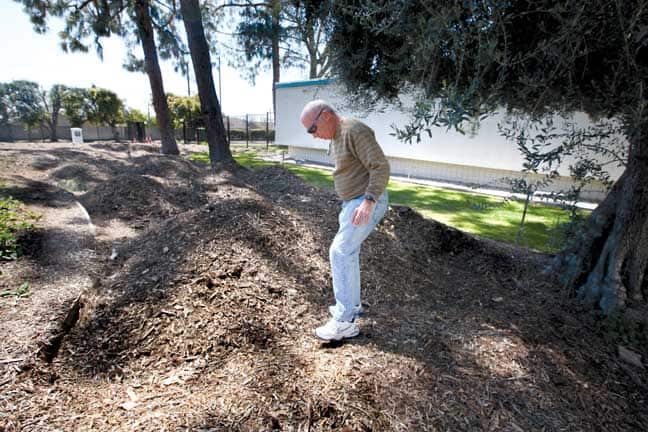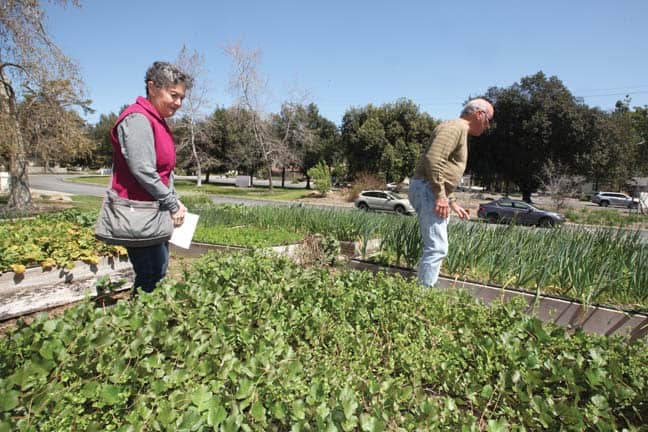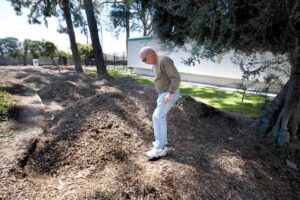Temple Beth Israel goes green with composting

by Steven Felschundneff | steven@claremont-courier.com
The grass may not be greener, but something very green is nonetheless happening at Temple Beth Israel.
Ten years ago, the Jewish temple had a large decorative lawn between the sanctuary and Towne Avenue. While attractive, the land was underutilized, so the temple partnered with the local nonprofit Uncommon Good to reimagine its use. Now it’s a 6,250-square-foot farm producing organic vegetables for Uncommon Good’s food distribution network.
“We took out the grass and made it fertile,” longtime Temple Beth Israel member Neil Gerard said during a recent visit to the farm with his wife Joan.
Since the weather is still wintery the farm is mostly fallow, but on a rare warm day this week a few crops, scallions and a variety of chard sprouted from the maze of raised beds.
Farming was just the beginning of the land’s adaptive reuse, and late last year Temple Beth Israel added a new composting facility. Tucked under some trees adjacent to the sanctuary, and mostly hidden from sight by the farm itself, the food waste composting is happening in roughly a dozen mounds covered with mulch.
The now six-month-old compost heap has yet to produce any soil, because it takes several months for the decomposing process to work, and it needs heat from the sun which has been notoriously missing around here lately. But once it’s in full swing it should produce all the compost that the farm at the temple needs and perhaps some left over for the other eight community gardens run by Uncommon Good.

Joan Gerard, and her husband Neil, check out what type of plants are growing during a recent visit to the community farm at Temple Beth Israel in Pomona. The farm, which is operated by Uncommon Good, has been providing organic vegetables to low income families for ten years. Courier photo/Steven Felschundneff
The work is funded through a CalRecycle Community Composting for Green Spaces grant. Food Cycle Collective gathers the organic waste from area restaurants and delivers it to the church, where Uncommon Good’s two full-time farmers tend to the compost piles, including the occasional turning of the soil.
“This local composting site, adjacent to the farm, works with the Composting for Green Spaces Program and will help to keep food waste out of landfills while also providing Uncommon Good farms with fresh compost to support their farming efforts. In addition, this program will enable Temple Beth Israel to assist local restaurants in recycling their food waste into fresh compost,” according to a news release from the temple. “Most importantly, this program, approved by the Board of Trustees, supports the Temple’s mission of Tikkun Olam, Repairing the World.”
In January the farm was given high praise by members of the US Composting Council during a tour of local composting sites as part of its national conference in Ontario.
“Uncommon Good’s urban agriculture programming allows us to fill this gap, as we are able to control the means of production and distribution of our organic produce,” according to the organization’s website. “This ensures that the families we serve receive wonderful organic fruits and vegetables that they normally would not have access to. In fact, in just the past year, Uncommon Good has provided more than 6,000 tons of fresh produce to local families in need.”

Neil Gerard inspects the composting piles during a recent visit to the community farm at Temple Beth Israel in Pomona. Courier photo/Steven Felschundneff
For years Uncommon Good ran a public market at its location on Foothill Boulevard, selling some of the produce grown at the farms to fund other projects. However, during the pandemic the organization decided to refocus on its mission of “breaking intergenerational poverty” and now nearly all the food grown at Temple Beth Israel, and the other community gardens, goes directly to low-income individuals and families, according to farm director Johanna Teissere. Still, Uncommon Good does occasionally sell fruits and vegetables if the pantry has so much inventory that there is a danger of something going to waste.
“The word has spread, so we’re getting some elderly folks from Claremont who select vegetables and bulk dry goods,” Teissere said.
The dry foods are provided by yet another local partner, Love for Humanity, which buys in bulk at Costco and delivers them Uncommon Good.
Uncommon Good was founded in 2000 by Executive Director Nancy Mintie. Initially it offered student loan repayment assistance programs for community clinic doctors and legal aid lawyers, who were graduating with so much debt they could not afford to take jobs serving the poor because of the low pay.
The organization added the Connect to College program in 2004, which helps students succeed in school and go to college. The urban farming program, Community Alliance for Urban Sustainable Agriculture, began in 2008 in response to increased poverty brought on by the Great Recession. The program produces about 20 tons of produce each year.
“When COVID struck, Uncommon Good kept its doors open and added new programs, such as a regional food pantry and an emergency fund,” according to its website. “It also sponsored an innovative, first-of-its-kind-in-the-US mental health pilot program to bring affordable, effective mental health services to the low-income Spanish speaking population of the region.”
Uncommon Good also collects fruits and vegetables from local backyards through its community gleaning program. If any reader has a tree teeming with fruit, or an abundance of tomatoes, please contact the organization to become a gleaning partner. You can also call (909) 625-2248 for more information.









0 Comments